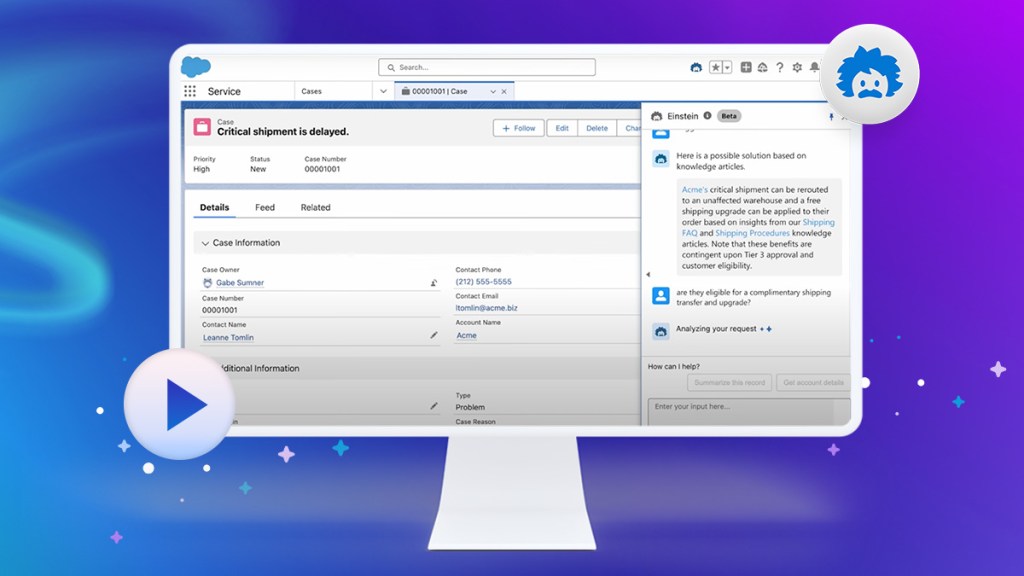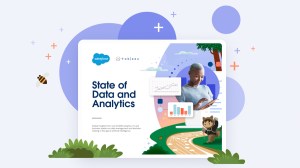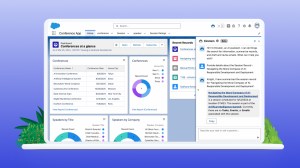Quick take: Salesforce’s State of Data and Analytics report, based on surveys of more than 10,000 technical and business leaders, reveals concerns about trusted data and security as organizations look to take advantage of advancements in artificial intelligence.
Data security and reliability have long been critical to the success of business initiatives. But rapid advancements in artificial intelligence (AI) have made these elements all the more important. As Salesforce Chief Data Officer Wendy Batchelder sees it, “The AI revolution is actually a data revolution, and a company’s AI strategy is only as strong as its data strategy, with trust at its core.”
The AI revolution is actually a data revolution, and a company’s AI strategy is only as strong as its data strategy, with trust at its core.
Wendy Batchelder, Chief Data Officer, Salesforce
Nearly 9 in 10 (87%) analytics and IT leaders agree: advances in AI make data management a higher priority.
The Salesforce State of Data and Analytics report, featuring insights from more than 10,000 leaders across 18 countries, finds a lack of confidence in data accuracy among respondents. Additionally, data security emerged as their biggest challenge to managing and leveraging data for business needs.
To navigate these challenges, leaders are focusing on improving data governance and creating a data culture to meet the moment.
Lack of trusted data stokes fears of missing out on AI’s benefits
Companies today are laser-focused on leveraging generative AI to improve productivity, efficiency, and grow revenue.
Recent Salesforce research reveals early adopters are already seeing results, including faster customer service resolution times and increased sales. It’s no surprise, then, that business leaders fear falling behind.
77% of business leaders are worried their company is missing out on generative AI
To cash in on AI’s promise, leaders must first get their data in order. Fueling effective AI — generative and otherwise — requires secure, reliable data inputs. Indeed, 92% of analytics and IT leaders say the need for trusted data is higher than ever.
Line-of-business leaders are less confident in data quality compared to analytics and IT leaders
Teams closest to the data, namely, data and analytics, have the most confidence in their data’s accuracy. Yet even these teams have ample room for improvement: only 57% of data and analytics leaders are completely confident in their data. Line-of-business departments, like marketing, sales, and service, are even more skeptical, with an average of 43% completely trusting their data.
Customer service teams, whose performance relies on a timely and accurate mix of customer feedback data, support ticket information, product details, and customer information, are especially doubtful of their data’s quality.
Say hello to Einstein Copilot

Video: Einstein Copilot Product Launch
Security threats and lack of data harmonization hinder data reliability
While the lack of trust highlights companies’ struggle to use data to underpin AI-powered solutions, the number one challenge among those surveyed is data security threats.
A recent Salesforce survey found that 65% of IT leaders experienced a security breach between June 2021 and June 2022. Among those who experienced a breach, 35% were not able to recover any impacted data. Generative AI brings the added risk of proprietary company data leaking into public large language models.
Rising cybersecurity concerns are compounded by another major factor: organizational data is increasing in both volume and complexity, expanding the threat surface.
Over two-thirds (68%) of analytics and IT teams anticipate data volumes to increase over the next 12 months. They anticipate the growth to be substantial. On average, technical leaders expect about 20% growth across a variety of sources including first-party data, third-party data, and device data — a likely undercount given independent research studies.
Managing an increase in data from a wide variety of sources is more than a security consideration: it’s a technical challenge to standardize. After security threats, analytics and IT leaders cite lack of data harmonization as the biggest barrier to extracting value from their data sources. The downstream effects of disparate, siloed data concerns business leaders, who cite overwhelming data volumes and a lack of a single source of truth as major barriers to leveraging their own data. They also cite a lack of training and efficient ways to extract insights as the third and fourth biggest data challenges in their organizations, respectively.
Data governance and data culture are keys to effectively leveraging data
A key part of building a foundation for AI success is data governance — the set of rules or policies by which information is collected, managed, stored, measured, and communicated within an organization.
By establishing clear parameters for data access, accuracy, privacy, security, and retention, savvy leaders leverage data governance to ensure quality, democratize access, and protect privacy. An effective data governance can provide clarity into key questions: Questions around data accuracy (e.g., Is the data correct and without discrepancies?), completeness (e.g., Am I getting the full picture?), reliability (e.g., Is the data consistent and trustworthy over time and across contexts?), and relevance (e.g., Does the data provide the insight I need?).
The vast majority of analytics and IT leaders surveyed use data governance as a tool to ensure and certify baseline data quality (85%), a framework to inspire trust in data (84%), and an effective way to democratize data access (81%).
One member of Tableau’s Data Leadership Collaborative and head of Data Analytics at Teamwork, Kevin O’Callaghan, sees clear potential in data governance to inform their AI strategy, “One change I’m considering today is expanding our governance committee to be an AI governance board, too.” In his words, “An AI governance board as an extension of our data governance provides stakeholders with a transparent view into AI priorities, use-cases, and pain points. This helps translate and track how AI visions are turned into manageable, measurable realities.”
Of course, improving trust in data is more than a technical fix; fostering a strong data culture — creating a mindset and practice around the value of being a data-driven company — is critical to driving confidence and adoption. Research has found that data-driven companies perform better by almost every metric.
Over 7 in 10 companies are increasing budgets for data analysis tools and training.
- 79% of analytics and IT leaders are investing more in data analysis and visualization tools compared to last year.
- 75% analytics and IT leaders are investing more in training and development compared to last year
“Managing data is the most important action a business can take to successfully implement generative AI,” said Batchelder. “To effectively manage data, leaders must use data governance strategically and invest in a strong culture now more than ever.”
More information
- Read the full State of Data and Analytics report
- Check out the blog Data Strategy in an AI-First World: Here’s Where to Start
- Discover how Tableau AI drives smarter decisions
- Get started with Data Cloud today
- See how Einstein Trust Layer can drive productivity with generative AI
Methodology
Data in this report are from two double-anonymous surveys conducted from June 16 through July 31, 2023. The first survey generated 5,540 responses from analytics and IT decision makers from 18 different countries across North America, Latin America, Asia-Pacific, and Europe. The second survey generated 5,540 responses from line-of-business leaders from the same countries. More details can be found in the report. Cultural bias impacts country-level survey results.


















